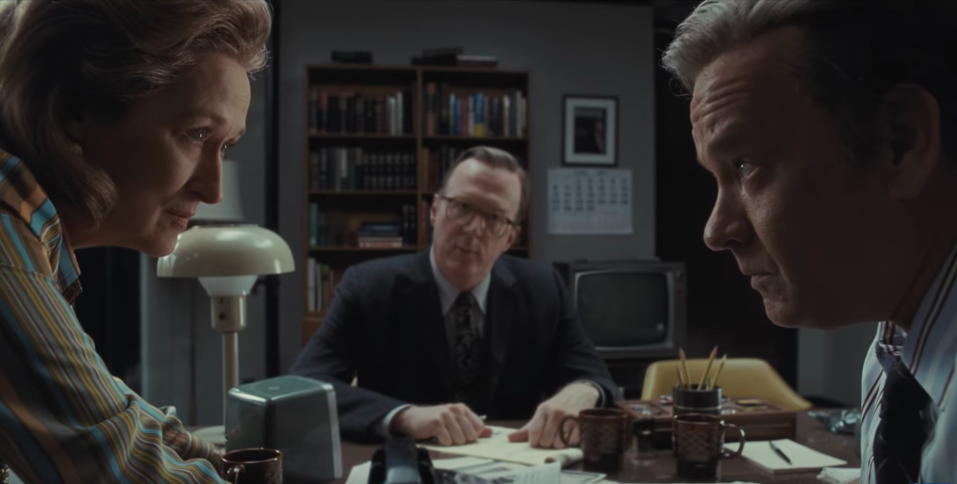There’s never been a movie quite like The Post. Steven Spielberg’s latest drama focuses on the Washington Post’s role in reporting the Pentagon Papers, and it has a little bit of everything. The Post is nail-biting, it’s thrilling and even somewhat nostalgic.
The movie opens in Vietnam. After a quick but gruesome battle sequence, the camera cuts to a young Daniel Ellsberg (the military analyst responsible for disseminating the papers) at his typewriter. Then, he’s suddenly on a plane. The camera zooms in on a conversation between Ellsberg and Robert McNamara, defense secretary during the Kennedy and Johnson presidencies. In both McNamara and Ellsberg’s eyes, the war in Vietnam cannot be won. While these scenes are crucial in providing background for the movie, they can also be confusing to younger generations.
Admittedly, a little bit of mystery is important in any movie. However, I found myself explaining the first ten minutes to my peers, making for a frustrating movie going experience. Unfortunately, students nowadays rarely learn about the Pentagon Papers, the classified Department of Defense study about the United States’ involvement in the Vietnam War, in their United States history classes, but maybe that’s just a drawback of our education system.
Another point of confusion is McNamara himself. While the audience is introduced to McNamara in the first few scenes, viewers are told little about him. Though an integral character in the film’s plot, he disappears for a majority of the first half. By the time he’s reintroduced, many viewers have forgotten who he is.
Despite this complicated and undoubtedly convoluted beginning, the remaining moments are exhilarating and entertaining. Shifting focus, viewers are catapulted into the early 1970’s and a tense meeting between the Washington Post’s leadership. At one end there’s Ben Bradlee (Tom Hanks), the headstrong editor in chief. Both outgoing and attentive, Bradlee embodies the principles of a good journalist. More importantly, he’s the watchdog society needs. On the other end there’s publisher Katharine Graham (Meryl Streep). Merely thrust into the position after the death of her husband, she’s confident on the outside, but unsure of herself and her leadership abilities. Graham wants the newspaper to succeed, but at the same time she’s afraid to push the envelope.
Throughout the movie, both Graham and Bradlee’s strong personalities continuously butt heads. Bradlee is an idealist. When faced with the decision to publish the Pentagon Papers, he fights to protect the American public and expose the government’s lies. But Graham, the realist, worries about both the financial and legal repercussions of publishing the documents. More importantly, she’s worried about her friendship with McNamara. Eventually, the two overcome their differences in the name of the American public and freedom of the press.
While at times the movie drags on with lengthy and unnecessary conversation scenes, it’s nevertheless exhilarating. Viewers feel the pressure of Bradlee and Graham’s decision even if they already know the ending. However, in some ways, the story differs from reality. For example, it paints the Washington Post as the integral publisher of the Pentagon Papers and downplays the importance of the New York Times. As the first newspaper to publish the documents, the Times’ was a catalyst for the Post’s actions. It’s understandable considering the movie is called The Post, but at the same time the New York Times deserved more justice.
Regardless, The Post demonstrates the necessity for good investigative journalism. The closing scene of the movie echoes this belief. The camera closes in on an angry Richard Nixon, who demands Washington Post reporters be barred from the White House. The scene resonates with viewers, echoing the political climate of 2018. It reminds audiences of the importance of not just acknowledging, but also exercising our rights to free speech and free press.



